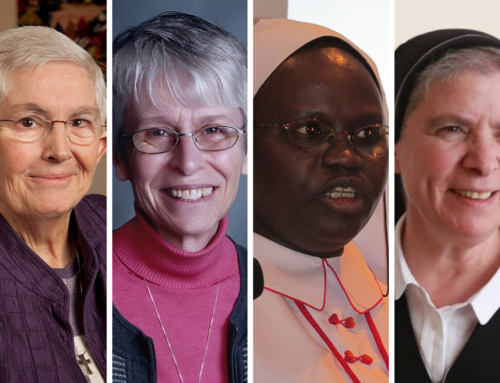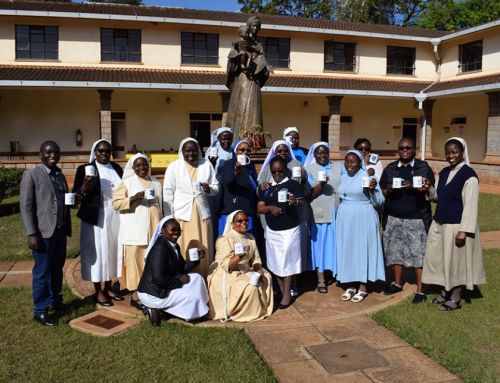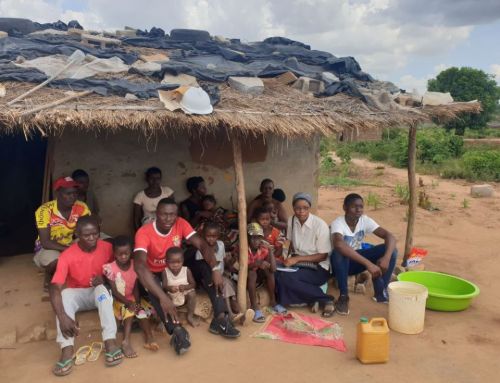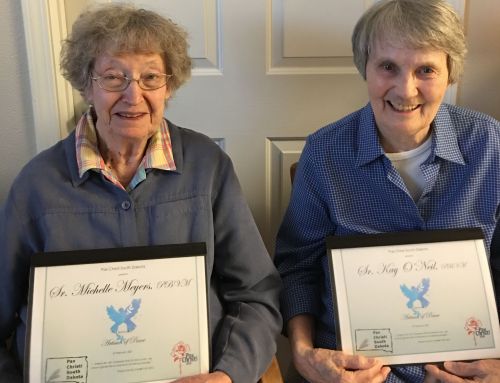Sisters Pat Prunty and Myra Remily of the Presentation Convent speak about human trafficking and why it’s important to be aware of the fact that it can and does happen in South Dakota.
Human Trafficking in South Dakota By Elisa Sand with Aberdeen News – esand@aberdeennews.com |
A local social justice group is working to educate people about an industry that thrives the less folks know about it. Raising awareness about human trafficking is just one of the ministries the Aberdeen-based Presentation Sisters are involved with, but it’s a topic that affects much of the work they do.
Sisters Myra Remily and Pat Prunty are active with Pax Christi, an organization they’ve used as a forum to discuss a variety of issues, including human trafficking. Prunty said the first time the group scheduled a speaker on the topic, many people who attended didn’t know what human trafficking was.
“It takes years to bring awareness to it,” Remily said. “Today, there are still people who are naive, but more people are aware of what’s happening.”
Human trafficking is the illegal movement of people for the purpose of providing forced labor or commercial sexual exploitation. The Presentation Sisters aren’t the only ones out there talking about it either. U.S. Rep. Kristi Noem announced bipartisan legislation in January to combat human trafficking, and former U.S. Attorney Brendan Johnson made it a priority to investigate and prosecute cases. But even though people in South Dakota are becoming more aware, South Dakota’s laws are ranked among the least-effective when it comes to combating trafficking.
According to Polaris, a group that works with government leaders to put regulations in place to combat human trafficking, South Dakota and North Dakota laws are categorized as Tier 3. That means there are several components that are missing when it comes to the tools needed to investigate and combat human trafficking, according to the group. But, the ranking is an improvement as South Dakota’s previous ranking was lower, at Tier 4.
Prunty and Remily said events, such as Sturgis motorcycle rally and pheasant hunting season, draw a significant number of out-of-staters to South Dakota. They are also events where human trafficking can thrive.
Young girls at the Sturgis rally can be recruited and hunting lodges provide places where young girls can be brought into the state, Remily said.
“Some stand on the street (at Sturgis) soliciting victims,” Remily said. “They’re not afraid to be out there in front.” According to statistics from the U.S. Attorney’s office, nine arrests were made at the Sturgis Motorcycle Rally in 2013 and another five took place in 2014. Of those cases prosecuted in 2013, six involved cases of involuntary servitude and forced labor and three were convicted of commercial sex trafficking.
People who don’t think human trafficking is a problem in South Dakota are wrong, Remily said. The problem is even more local than that.
“It does exist here in Aberdeen,” she said. Chris White, chief deputy state’s for Brown County, said he’s heard of several human trafficking cases in Sioux Falls area, but that there are no criminal cases he knows of in Brown County.
Prunty and Remily said the most vulnerable are those in the lowest-income brackets. That includes, but is not exclusive to, American Indian populations. Prunty and Remily said a trafficking scenario could involve a parent that sells his or her daughter or the services of a daughter.
Runaways are also targets. Prunty said runaways might be approached by someone who offers them food, shelter and maybe even clothes. But, the girls soon learn, there’s a catch when they are asked to spend time with men.
“Suddenly they’re stuck, and there’s no way out,” Prunty said.
Oftentimes, she said, the young girls are scared they will get in trouble if law enforcement finds out and are convinced they have an obligation to the person who helped them in the first place. Human trafficking isn’t exclusively a sex-trade industry. Prunty said that in some cases, families will be taken to a certain part of the country to fill a labor need with the understanding that they can earn their freedom. But their freedom never comes, making those situations no better than a modern-day version of slavery. How does it stop?
Remily and Prunty said awareness is key to reducing the amount of human trafficking. Prunty said two things hotel and motel managers can look for are:
• An unusual number of young people going into and out of a particular room.
• Situations where an adult and child enter a room, then the adult leaves or waits in the lobby.
“Awareness is extremely important,” Remily said. Who’s being arrested?
While some stuck in a human trafficking situation might think they are at risk of being arrested, Remily said that’s not the case. She said law enforcement officers investigating cases of human trafficking are pursuing charges against the leaders of the organization, not the young women forced into the industry. “They’re trying to get the higher-ups,” Remily said. Ultimately, the challenge is that it’s not well-known that human trafficking is taking place, Remily said. And, she said, those who capitalize on it don’t want people to be aware that it’s happening.
“Trafficking is such a subtly concealed situation,” Prunty said. “Secrecy is so much a part of it.” That’s precisely why educating people about the subject is so important, she said. It doesn’t have to be a complex undertaking. Simple steps can help. Prunty said even when people are aware of what’s happening in their neighborhood, it’s a blow against the offenders who don’t want people to learn about sordid world of human trafficking.
The next Aberdeen Pax Christi meeting is Tuesday, April 21 at 7 p.m. in the North Conference Room of Presentation Convent (1500 North Second Street) with guest speaker: Carna Atherton-Pray, director of Avera St. Luke’s emergency room, speaking on Human Trafficking. To learn more about Pax Christi, click HERE




